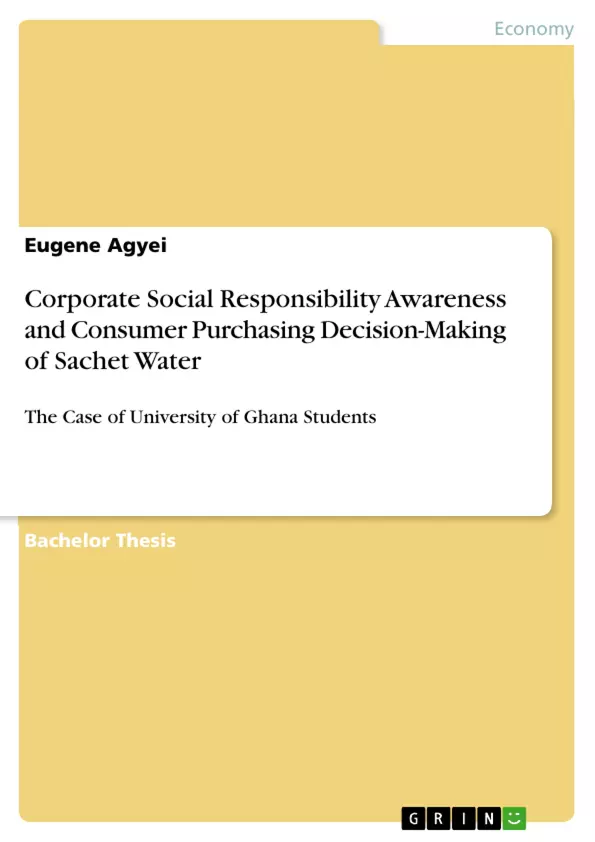The purpose of this study was to empirically investigate Corporate Social Responsibility (CSR) awareness and consumer purchasing decision-making of sachet water among University of Ghana students.
The study sought to find answers to the following questions: What is the awareness level of CSR activities of sachet water producers in Ghana among consumers? What are consumer perceptions about CSR activities of sachet water producers? How do CSR initiatives of sachet water producers influence purchasing behavior of customers?
A sample size of one hundred (100) consumers of sachet water was selected from University of Ghana for the study using the purposive random and convenience sampling method. The data obtained were analysed using Statistical Package for Social Sciences (SPSS 20.0) software. From the study, the researcher found out that, relatively fewer consumers of sachet water are aware of CSR activities of sachet water companies.
The study also discovered that more consumers highly perceived environmental friendly activities as corporate socially responsible. The study also revealed that, other factors such as product quality, brand, advertisements and price influence the purchasing decisions of sachet water buyers, even to a greater extent than CSR. It was found that consumers are particularly concerned about quality when buying sachet water.
However, CSR activities performed by sachet water companies were rated as a lesser factor that influence consumers stay and repurchase of sachet water. The researcher recommends, among other things, that regulatory bodies be firm in enforcing laws in corporate organizations. Again, CSR should be viewed as part of the code of ethics of any corporate organization, including sachet water companies. Also, the government should design national policies to set parameters for CSR in Ghana to reflect national needs.
Inhaltsverzeichnis (Table of Contents)
- CHAPTER ONE: GENERAL INTODUCTION TO THE STUDY
- 1.1 Introduction
- 1.2 Background of Study
- 1.3 1.2 Statement of Problem
- 1.4 Objective of the Research
- 1.4.1 General Objective
- 1.4.2 Specific Objective
- 1.5 Statement of Hypotheses
- 1.6 Significance of the Study
- CHAPTER TWO: LITERATURE REVIEW
- 2.1 Introduction
- 2.2 Theoretical Literature Review
- 2.2.1 Corporate Social Responsibility (CSR)
Zielsetzung und Themenschwerpunkte (Objectives and Key Themes)
The purpose of this research is to investigate the awareness of Corporate Social Responsibility (CSR) among students of the University of Ghana, focusing on the context of sachet water companies. It examines how this awareness influences consumer purchasing decisions regarding sachet water products. The study aims to answer key questions about consumer knowledge of CSR activities, their perceptions of these initiatives, and the extent to which CSR influences their purchasing behavior.
- Consumer awareness of CSR activities of sachet water companies in Ghana.
- Consumer perceptions of CSR initiatives implemented by sachet water producers.
- The impact of CSR activities on the purchasing decisions of sachet water consumers.
- The role of factors like product quality, brand, advertising, and price in influencing purchasing decisions.
- The relative importance of CSR compared to other factors in consumer loyalty and repurchase decisions.
Zusammenfassung der Kapitel (Chapter Summaries)
Chapter One provides an introduction to the study, outlining the background, statement of the problem, objectives, hypotheses, and significance of the research. Chapter Two delves into the theoretical literature review, focusing on the concept of Corporate Social Responsibility (CSR). The chapter explores the theoretical framework that underpins the study.
Schlüsselwörter (Keywords)
This study primarily focuses on Corporate Social Responsibility (CSR) awareness and its influence on consumer purchasing decisions within the context of sachet water companies in Ghana. It examines consumer perceptions of CSR activities, the role of factors like product quality and price, and the relative importance of CSR in consumer loyalty and repurchase decisions.
Frequently Asked Questions
Are consumers in Ghana aware of CSR activities by sachet water producers?
According to the study at the University of Ghana, relatively few consumers are actually aware of the Corporate Social Responsibility (CSR) activities performed by sachet water companies.
How does CSR influence the purchasing of sachet water?
While CSR is noticed, factors like product quality, brand reputation, price, and advertisements have a much greater influence on consumer purchasing decisions than CSR initiatives.
What CSR activities are most valued by consumers?
Consumers highly perceive environmentally friendly activities as the most significant form of corporate social responsibility for sachet water producers.
What is the most important factor when buying sachet water?
The study found that consumers are primarily concerned with the quality of the water when making their purchase decision.
What are the recommendations for CSR policy in Ghana?
The researcher recommends that the government design national policies for CSR to reflect national needs and that regulatory bodies strictly enforce laws for corporate organizations.
- Citar trabajo
- Eugene Agyei (Autor), 2017, Corporate Social Responsibility Awareness and Consumer Purchasing Decision-Making of Sachet Water, Múnich, GRIN Verlag, https://www.grin.com/document/370422



